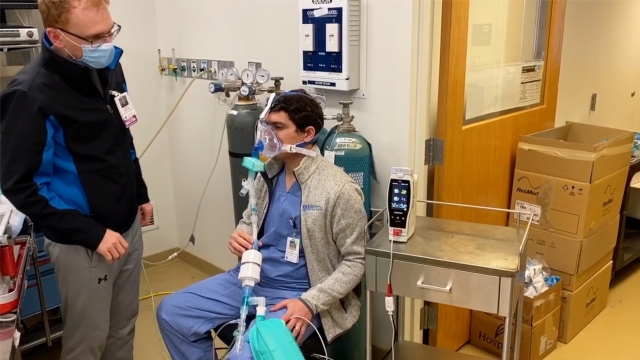"Everybody who knew me were, they were preparing for my passing," Bill Whyte recalls to Newsy.
When Whyte got COVID-19, his case was dire. He was on a ventilator for 40 days and received various treatments, including a gas that some clinicians have dubbed a "miracle molecule": nitric oxide.
"We think it played a major role in him," Dr. Keith Scott, Whyte's doctor and the nitric oxide clinical trial site lead investigator at LSU Health Shreveport, told Newsy.
Nitric oxide is a vasodilator, meaning it essentially tells blood vessels when to open or close, improving the flow of oxygen into the body via your heart.
Our body naturally produces nitric oxide in the lining of blood vessels, but it also has been an FDA-approved treatment for years in helping with oxygenation and blood flow. The treatment, an inhaled gas, is now being researched for COVID-19.
"Nitric oxide lowers the blood pressure when it is high. So it maintains a normal blood pressure. Nitric oxide also prevents the blood from clotting when it shouldn't clot," Dr. Lou Ignarro told Newsy.
Ignarro won a Nobel Prize for discovering nitric oxide’s effects on the body in the late '90s. N.O. was first used to treat babies born with a heart defect that causes high blood pressure in the lungs.
"And when these neonates were born, they were blue in color. And after just a few hours of inhaling nitric oxide gas, they turned into a pink color, and they were cured of this disease and could go home," he said.
Since then, N.O. has been used to treat everything from cardiovascular disease to erectile dysfunction. Right now, more than two dozen clinical trials are underway studying nitric oxide for COVID-19. The latest, at Tufts University, is run by a cardiologist studying if the gas slows COVID’s progression.
"Are there fewer people getting worse, requiring more oxygen, getting into the ICU, requiring intubation, dying, you know?" Dr. Marvin Konstam, chief physician executive at Tufts Medical CardioVascular Center and professor at Tufts University School of Medicine told Newsy.
Others involve doctors from different areas, including respiratory critical care and pediatric specialists like Dr. Ryan Carroll.
"The four clinical trials that we have ongoing are: One for severe patients who demonstrate respiratory failure or are on ventilators; [two,] patients who have moderate COVID-19. Third is a protocol targeting health care providers who take care of COVID-19 patients and [are] therefore at risk. Can we provide them with nitric oxide as a preventive therapy? ... And the fourth protocol is active in the emergency department, treating patients as they arrive with who have COVID-19," Carroll, a pediatric intensive critical care doctor at Massachusetts General Hospital, told Newsy.
Researchers Newsy spoke to are still recruiting patients and expect their results this fall. N.O. does have some drawbacks. It’s produced by a limited number of suppliers and is only administered by special personnel in a hospital.
Until a COVID-19 vaccine is approved, inhaled nitric oxide could be one of the next widely used treatment options.
"It's really hard for us to stand by and just provide supportive therapy if we can investigate and provide possible therapies with with possible efficacy. We're going to do it," Carroll said.


